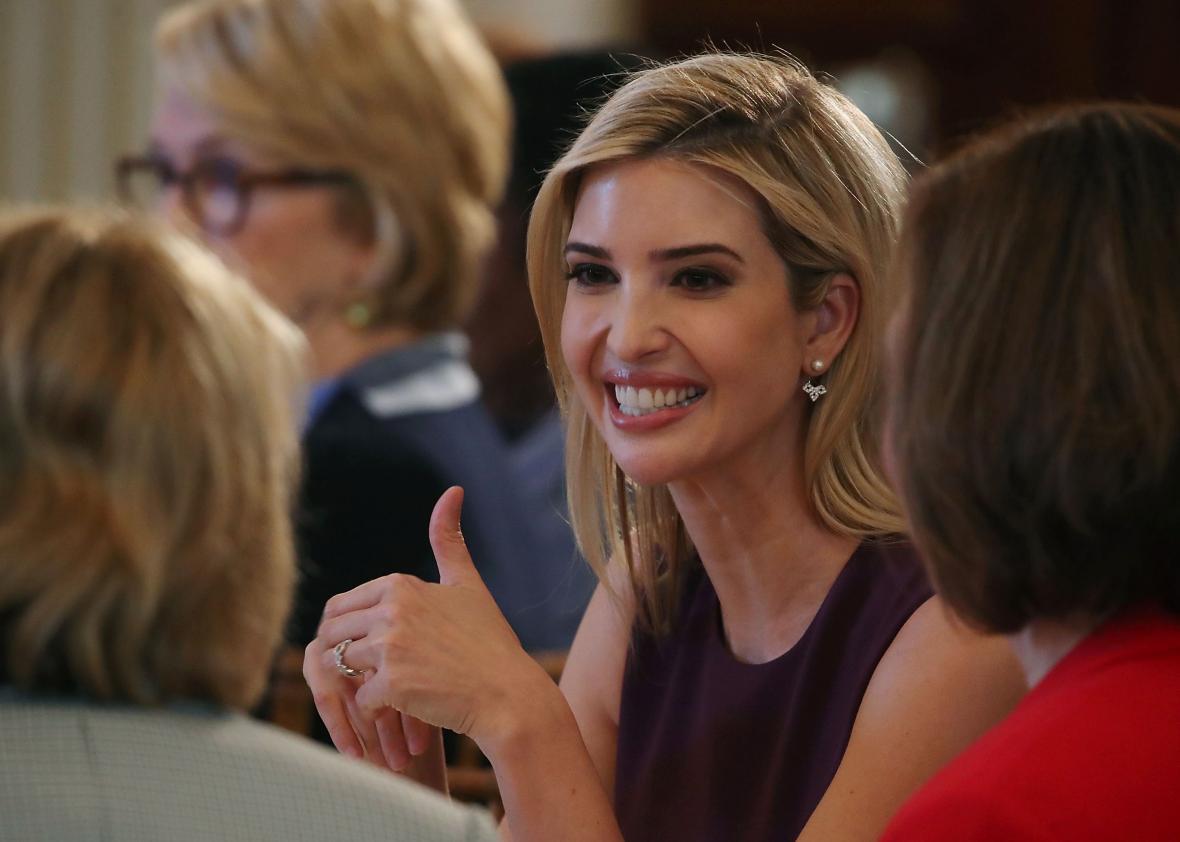Ivanka Trump’s personal PR campaign to portray herself as a reasonable, intelligent advocate for women struck a major victory on Sunday, when a piece about her work for paid parental leave ran in the New York Times. Painting the president’s daughter as a centrist family-policy crusader, the paper article ran under the headline “Ivanka Trump Takes On the Child Care Divide.” The digital version was triumphantly titled “Even Child Care Divides Parties. Ivanka Trump Tries Building a Bridge.”
This is a yuge oversell. Ivanka Trump’s contributions to advancements in child-care and family-leave policies have been slim and decidedly partisan. Last month, the Times reports, she invited a few legislators to the White House to discuss these policies. All the lawmakers were women, and all were Republican. Female Republicans are already a tiny minority in Congress and way more likely to support action on affordable child care and paid leave than their male counterparts. They’re neither the ones who control the agenda nor the ones that need convincing. But to the Times and, presumably, some outside observers who wonder why politicians can’t just all get along, Trump’s nominal efforts read as groundbreaking attempts at a compromise other politicians are too stubborn to achieve.
Trump and her husband, Jared Kushner, have been the subjects of so many “leaks” pushing the narrative that they’re common-sense forces of conscience in the White House, it’s hard to imagine the “leaks” could come from any source other than Trump and Kushner themselves. The couple allegedly stopped the president from reversing the Obama administration’s executive order on LGBTQ workplace protections. They were the heroes who cut lines slamming the Paris climate deal out of another executive order. A “senior administration official” claimed Ivanka Trump was responsible for her father’s words on “paid family leave … women’s health … clean air and clean water” in his first major address to Congress.
This is all very nice—it’s not every day you hear a Republican president say anything about new mothers having jobs. But these stories have done more good for Trump and her husband’s reputations than they have for working parents. Even if her proposed policies do come to fruition, they’ll provide meager assistance for low-income Americans while shoring up her self-invented image as a bipartisan bridge-builder who’s an approachable ally to #WomenWhoWork.
Ivanka Trump’s initial paid-leave proposal would have only benefited mothers who physically gave birth to their children, leaving out adoptive parents, same-sex couples, and non-birthing parents. She and her father pledged to fund it by eliminating, through unspecified means, “waste, fraud, and abuse” in the unemployment insurance program, which would have delivered an unknown sum of money. When Cosmopolitan’s Prachi Gupta pressed Trump on why her favored policy didn’t include men or any other parents who weren’t pregnant, Trump evaded the question, denied that her father had said things he’d absolutely said, insulted Gupta, and accused her of lying.
According to the Times, in response to criticism from lawmakers, White House officials are now considering expanding their proposed paid-leave plan to include all new parents and funding it through a tax increase or other means more certain than hypothetical unemployment fraud. But the child-care proposals Ivanka Trump has put forward still exclude or underserve low-income families who need external support the most. Under the regressive child-care tax deduction Trump is trying to sell to Congress, she would get a bigger benefit than the minimum-wage retail workers who sell her clothes. Another floated proposal would give people with children a tax-free savings account for up to $2,000 in annual child-care expenses, with a 50 percent match for the first $1,000 low-income parents contribute. The dent this would make in the average family’s yearly child-care burden—which ranges from $22,631 in Washington, D.C. to $4,822 in Mississippi—would be vanishingly small, meaning whatever good optics it might earn Trump and her father would almost certainly be disproportionate.
Of course, Congress might refuse to pass any of the Trumps’ halfway measures. In that case, the GOP wouldn’t be able to check family leave and child care off its look-like-we-did-a-thing-for-women list, but Ivanka would still get to claim her mantle as some kind of brilliant middle-of-the-road family-policy advocate who was unjustly stymied by Congress. With no formal policy role, Trump is risking nothing by helping her father seem like less of a detriment to women. Even if her meetings with Republican women yield nothing but feel-good talk, she’ll come out on top while American women wait for an advocate with their real interests in mind.
